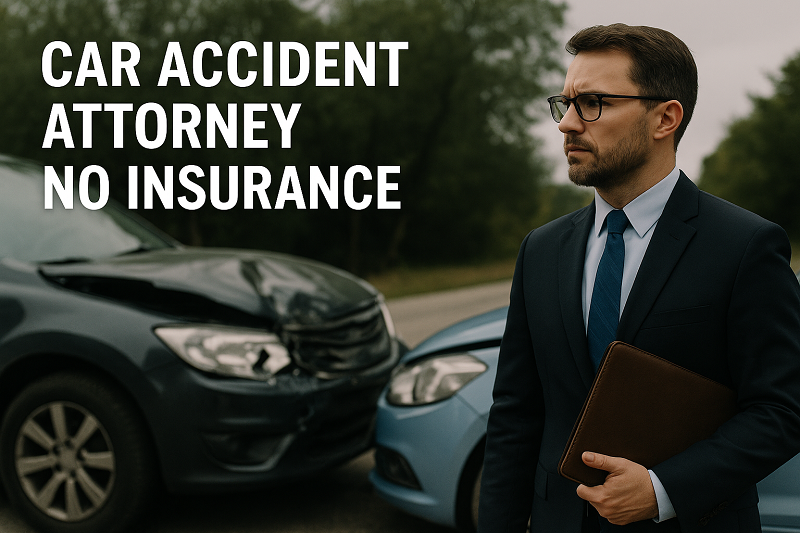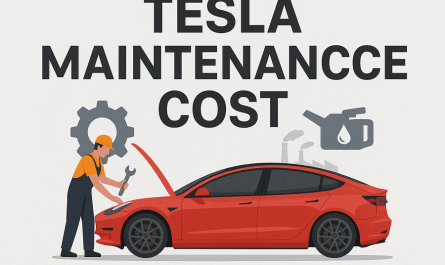Imagine the screech of tires, the violent jolt of impact, and in an instant your life changes. But what if, at that very moment, you realize something even worse: you don’t have car insurance? Whether it was a financial oversight, a lapse in coverage, or a choice made under pressure, being involved in a car accident without insurance puts you in a vulnerable and legally dangerous position.
You’re not just facing potential medical bills or vehicle repairs. You could be staring down lawsuits, wage garnishments, license suspension, and a ruined financial future. And if the other driver was uninsured too? The road ahead becomes even more uncertain.
But here’s the truth most people don’t realize: you still have options and they begin with the right legal help. In this in-depth guide, we’ll break down everything you need to know about dealing with a car accident when there’s no insurance involved. From legal consequences to the vital role of a car accident attorney, this article will help you understand your rights, limit your losses, and take back control of your future—even when the odds seem stacked against you.

Driving Without Insurance: What the Law Requires
Auto insurance is not optional in most states. Every driver is legally required to carry minimum levels of liability insurance to cover any damages or injuries they may cause to others in a traffic collision. The exact requirements vary by state, but most demand at least liability coverage that includes property damage and bodily injury.
In some areas, drivers must also carry uninsured or underinsured motorist protection, which can provide additional safeguards when the other party doesn’t have enough coverage. If you get into an accident and you’re uninsured, you’re not only risking financial loss—you may also be breaking the law. That can result in steep fines, license suspension, or even criminal charges, depending on the state and the severity of the situation.
What Happens If You’re Involved in an Accident Without Insurance?
Different outcomes are depending on whether you were responsible for the accident or the innocent party. Either way, the lack of insurance complicates everything.
When You Are at Fault and Have No Insurance
If you caused the accident and you don’t have car insurance, you are in a legally vulnerable position. The other driver can file a lawsuit against you to recover damages, which may include:
- Medical bills for injuries
- Lost wages from time off work
- Vehicle repairs or replacement
- Pain and suffering compensation
Since you don’t have insurance to absorb the costs, you will be held personally responsible. This means your personal assets could be seized—such as money in your bank account, your home, or even future wages—through a court judgment. In some cases, the injured party might accept a settlement payment plan, but the legal burden can be long-lasting and financially crippling.
When You Are Not at Fault but Still Uninsured
Being uninsured doesn’t automatically make you liable if you didn’t cause the accident. However, that doesn’t mean you’re off the hook. Depending on where you live, you may still face penalties simply for driving without insurance. These consequences can include:
- Receiving a citation from police
- Paying fines or administrative fees
- Losing your driver’s license and car registration
- Facing restrictions on what damages you’re allowed to claim (due to “No Pay, No Play” laws)
You can still pursue compensation from the at-fault party, but your lack of coverage may weaken your case or limit what you’re legally allowed to recover.
What to Do If the Other Driver Has No Insurance
If you’re involved in a collision and the other driver is uninsured, the process of recovering your damages can be much more challenging. Ideally, your own insurance policy includes uninsured motorist (UM) coverage, which will help pay for your medical costs and property damage when the responsible driver lacks coverage.
However, if you don’t have UM coverage or if you’re uninsured yourself, your only option may be to sue the at-fault driver personally. This can be a long and complex process—and there’s no guarantee you’ll recover the full amount, especially if the other driver also lacks the financial means to pay a judgment.
The Critical Role of a Car Accident Attorney in No Insurance Cases
A car accident attorney becomes especially important when either party in a crash lacks insurance. These legal professionals can make a huge difference by protecting your rights, managing court proceedings, and advising you on the best course of action based on your state’s specific laws.
Investigating and Proving Fault
One of the first responsibilities your attorney will take on is determining and proving fault. They will analyze the accident scene, review police reports, collect witness statements, and potentially work with accident reconstruction experts to establish liability. When insurance isn’t involved, strong legal representation is your primary weapon in proving your side of the story.
Filing a Lawsuit or Claim
If you were injured by an uninsured driver, your lawyer can help you file a personal injury lawsuit. If you’re the uninsured party and at fault, your attorney may still be able to reduce your financial exposure by negotiating settlements or defending you in court. Lawyers understand how to work within the legal system to get you the best possible result under tough circumstances.
Negotiating Settlements and Payment Plans
In many cases, a full-blown trial is not necessary. A skilled attorney can work out a settlement agreement with the other party. This is especially helpful if you’re uninsured and facing a potential judgment. Instead of having your wages garnished or assets seized, you may be able to negotiate a manageable payment plan, potentially avoiding long-term damage to your finances.
Reducing Penalties and Legal Consequences
An experienced car accident attorney can also help minimize any fines or penalties you’re facing for driving without insurance. In states with tough laws, this legal defense can be the difference between a suspended license and a reduced citation or reinstatement plan. If this was your first offense or you can demonstrate financial hardship, your lawyer may be able to argue for leniency in court.
Understanding “No Pay, No Play” Laws and How They Affect Your Rights
Some states have what are known as “No Pay, No Play” laws. These laws are designed to discourage drivers from going uninsured by restricting their ability to collect compensation—even when they’re not at fault in an accident.
Under these rules, if you’re uninsured, you may not be allowed to recover compensation for non-economic damages like:
- Emotional distress
- Pain and suffering
- Loss of quality of life
You may still be able to recover economic damages such as medical costs and lost wages. States with active No Pay, No Play laws include Louisiana, Alaska, Michigan, and California, among others. A knowledgeable attorney will know whether such restrictions apply in your case and will work to ensure that you recover whatever compensation is legally available.
What If Both Drivers Are Uninsured?
When both parties in a collision are uninsured, the situation becomes especially complicated. There is no insurance company to help cover damages, meaning both drivers could be left responsible for their own expenses—even if one clearly caused the crash.
If the other driver was responsible, your lawyer may still pursue legal action to help you recover costs. However, it often comes down to whether the at-fault party has any money or assets. If they don’t, the court can issue a judgment, but collecting on it could be nearly impossible. In these situations, legal guidance is absolutely necessary to explore every possible option for financial recovery.
What Are the Legal Penalties for Driving Without Insurance?
States differ in how they handle uninsured drivers. Here’s a quick overview of common penalties for first-time offenders in several states:
| State | Fines for No Insurance | License Suspension | Possible Jail Time |
|---|---|---|---|
| California | $100–$200 | Yes | No |
| Texas | $175–$350 | Yes | Sometimes |
| Florida | Up to $500 | Yes (up to 3 years) | No |
| Illinois | $500+ | Yes | Yes (repeat cases) |
| New York | Up to $1,500 | Yes | Up to 15 days |
In many states, repeated offenses can lead to increased fines, longer suspensions, and mandatory court appearances. Some even require SR-22 insurance filings, which are high-risk policies that can double or triple your premium when you do get coverage again.
Steps to Take After an Accident If You’re Uninsured
If you’ve been in an accident and don’t have insurance, time is of the essence. Follow these steps to protect yourself legally:
- Call the police and file an official report – This document will be critical later.
- Do not admit guilt at the scene – Let the investigation determine fault.
- Exchange contact and vehicle information – Even if you’re uninsured, this is a legal requirement.
- Take photos of the accident – Document damage, injuries, and road conditions.
- Get medical attention if needed – Not only for your health but to support any injury claims.
- Consult a qualified attorney immediately – Don’t wait until you’re sued or charged.
The sooner you involve a lawyer, the better they can defend you and guide you through your legal options.
Long-Term Consequences of Driving Without Insurance
The financial implications of being uninsured extend far beyond the accident. Here’s what you might face long-term:
- Paying for the other driver’s medical and repair costs out of pocket
- Losing your license and car registration
- Having to file for SR-22 insurance for several years
- Paying court-ordered judgments over months or even years
- Being denied compensation for injuries due to No Pay, No Play laws
Hiring a car accident attorney is one of the most effective ways to minimize these consequences and move forward with as little damage as possible.
Final Thoughts: Why Legal Help Is Crucial When You’re Uninsured
A car accident involving an uninsured driver can turn into a legal nightmare very quickly. Whether you’re at fault or a victim, having a knowledgeable car accident attorney on your side is essential. They can help protect your rights, minimize your liabilities, and guide you through complex legal procedures that can otherwise leave you financially devastated. Don’t wait until it’s too late seek professional help to handle the situation responsibly and strategically. The cost of legal representation is often a small price to pay compared to the long-term damage of going it alone.
FAQs About Car Accidents and No Insurance
Can I file a claim if I don’t have car insurance?
Yes, you can still sue the at-fault driver, although certain state laws may limit the damages you can recover.
Will I go to jail for being uninsured in an accident?
Some states impose jail time for repeat offenders, but first offenses usually result in fines and license suspension.
Can a car accident lawyer help me avoid paying everything out of pocket?
Yes, an attorney can negotiate settlements, reduce judgment amounts, or even get cases dismissed in some instances.
How much does a car accident attorney cost?
Many personal injury lawyers work on a contingency fee basis, meaning they only get paid if you win your case or reach a settlement.
Is it ever too late to get legal help after an uninsured accident?
While acting quickly is best, a lawyer can often help even weeks or months later, depending on state deadlines and the nature of the case.


